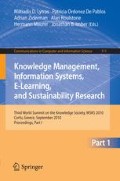Abstract
This paper presents an infrastructure approach for the evaluation of e-learning. It elaborates [12]’s concept of infrastructures for learning considering a cognitive, an epistemological, a social and a technical infrastructure. Within each infrastructure, the paper takes specific aspects that are important for evaluation. The paper concludes with stressing the importance of evaluation for building knowledge societies.
Access this chapter
Tax calculation will be finalised at checkout
Purchases are for personal use only
Preview
Unable to display preview. Download preview PDF.
References
Abran, A., Khelefi, A., Suryn, W., Seffah, A.: Usability meanings and interpretations in ISO standards. Software Quarterly Journal 11, 325–338 (2003)
Bodea, C.-N., Dascalu, M., Coman, M.: Quality of project management education and training programmes. International Journal of Knowledge Society Research 1, 13–25 (2010)
Buendia Garcia, F., Hervas Jorge, A.: Evaluating e-learning platforms through SCORM specifications. In: Proceeding of the IADIS Virtual Multi Conference on Computer Science and Information Systems, MCCSIS 2006 (2006)
Bürg, O., Mandl, H.: Akzeptanz von E-Learning von Unternehmen. Zeitschrift für Personalpsychologie 4, 75–85 (2005)
Davies, F.: Perceived usefulness, perceived ease of use and user acceptance of information technology. MIS Quarterly 13, 319–339 (1989)
Diaz Gibson, J., Civis Zaragoza, M., Longas Mayayo, J., Murat, L.: The study of educative network organizations in the city of Barcelona: The Nou Barris district. International Journal of Knowledge Society Research 1, 26–37 (2010)
Ertl, B., Kopp, B., Mandl, H.: Effects of an individual’s prior knowledge on collaborative knowledge construction and individual learning outcomes in videoconferencing. In: Computer Supported Collaborative Learning 2005: the Next 10 Years!, pp. 145–154. Lawrence Erlbaum Associates, Mahwah (2005)
Henninger, M., Balk, M.: Integrative Evaluation: Ein Ansatz zur Erhöhung der Akzeptanz von Lehrevaluation an Hochschulen. Ludwig-Maximilians-Universität, München (2001)
Information Society for All. Definitions & Glossary, http://is4all-webics.forth.gr
Kreijns, K., Kirschner, P., Jochems, W.: The sociability of computer supported collaborative learning environments. Educational Technology & Society 5, 8–22 (2002)
Lave, J., Wenger, E.: Situated learning: Legitimate peripheral participation. Cambridge University Press, New York (1991)
Lakkala, M.: The pedagogical design of technology enhanced collaborative learning, http://www.elearningeuropa.info/files/media/media13028.pdf
Mandl, H., Hense, J.: Lässt sich Unterricht durch Evaluation verbessern?. In: Spuren der Schulevaluation. Zur Bedeutung und Wirksamkeit von Evaluationskonzepten im Schulalltag, pp. 85–99. Klinkhardt, Bad Heilbrunn (2007)
Mandl, H., Friedrich F.: Handbuch Lernstrategien. Hogrefe, Göttingen (2005)
Nielsen, J.: Usability 101: Introduction to Usability, http://www.useit.com/alertbox/20030825.html
Pintrich, P., Smith, D., Garcia, T., Mckeachie, W.: Reliability and predictive validity of the motivated strategies for learning questionnaire (MSLQ). Educational and Psychological Measurement 53, 801–813 (1993)
Reinmann-Rothmeier, G., Mandl, H., Erlach, C., Neubauer, A.: Wissensmanagement lernen. In: Ein Leitfaden Zur Gestaltung Von Workshops und zum Selbstlernen. Beltz, Weinheim (2001)
Ronchetti, M.: A different perspective on lecture video-streaming: how to use technology to help change the traditional lecture model. International Journal of Knowledge Society Research 1, 50–60 (2010)
Schaumburg, H.: Die 5 Ws der Evaluation von E-learning, http://www2.hu-berlin.de/didaktik/de/personal/schaumburg/Texte/Text_II_Schaumburg_75_83.pdf
Schuler, H., Stehle, W.: Neuere Entwicklungen des Assessment-Center-Ansatzes – beurteilt unter dem Aspekte der sozialen Validität. Zeitschrift für Arbeits- und Organisationspsychologie 27, 33–44 (1983)
Schweizer, K., Pächter, M., Weidenmann, B.: A field study on distance education and communication: Experiences of a virtual tutor. Journal of Computer Mediated Communication 6 (2001)
Sfard, A.: On two metaphors for learning and the dangers of choosing just one. Educational Researcher 27, 4–13 (1998)
Shapiro, A.: Prior Knowledge Must Be Included as a Subject Variable in Learning Outcomes Research. American Educational Research Journal 41, 159–189 (2004)
Stark, R., Mandl, H.: “Unauffällige", "Vorwissensschwache", "Unmotivierte" und "Musterschüler": Homogene Untergruppen beim Lernen mit einem komplexen Lösungsbeispiel im Bereich empirischer Forschungsmethoden. Ludwig-Maximilians-Universität, München (2002)
Stockmann, R.: Evaluation in Deutschland. In: Evaluationsforschung. Grundlagen und ausgewählte Forschungsfelder, pp. 11–40. Leske + Budrich, Opladen (2000)
Stufflebeam, D.L.: An introduction to the PDK book. Educational evaluation and decision-making. In: Educational Evaluation: Theory and Practice, pp. 128–150. Charles A. Jones Publication, Wadsworth Publishing Company, Belmont, CA (1978)
Tennyson, R., Schott, F., Seel, N., Dijkstra, S.: Instructional Design: International Perspectives. Lawrence Erlbaum Associates, Mahwah (1997)
Tergan, S.-O., Schenkel, P.: Was macht Lernen erfolgreich? Evaluation des Lernpotentials von E-learning. In: Handbuch E-learning, ch. 4.20. Fachverlag Dt. Wirtschaftsdienst, Köln (2001)
Weinberger, A.: Scripts for computer-supported collaborative learning. Ludwig-Maximilians-Universität, München (2003)
Author information
Authors and Affiliations
Editor information
Editors and Affiliations
Rights and permissions
Copyright information
© 2010 Springer-Verlag Berlin Heidelberg
About this paper
Cite this paper
Ertl, B., Ebner, K., Kikis-Papadakis, K. (2010). An Infrastructure Approach for the Evaluation of E-Learning. In: Lytras, M.D., Ordonez De Pablos, P., Ziderman, A., Roulstone, A., Maurer, H., Imber, J.B. (eds) Knowledge Management, Information Systems, E-Learning, and Sustainability Research. WSKS 2010. Communications in Computer and Information Science, vol 111. Springer, Berlin, Heidelberg. https://doi.org/10.1007/978-3-642-16318-0_11
Download citation
DOI: https://doi.org/10.1007/978-3-642-16318-0_11
Publisher Name: Springer, Berlin, Heidelberg
Print ISBN: 978-3-642-16317-3
Online ISBN: 978-3-642-16318-0
eBook Packages: Computer ScienceComputer Science (R0)

